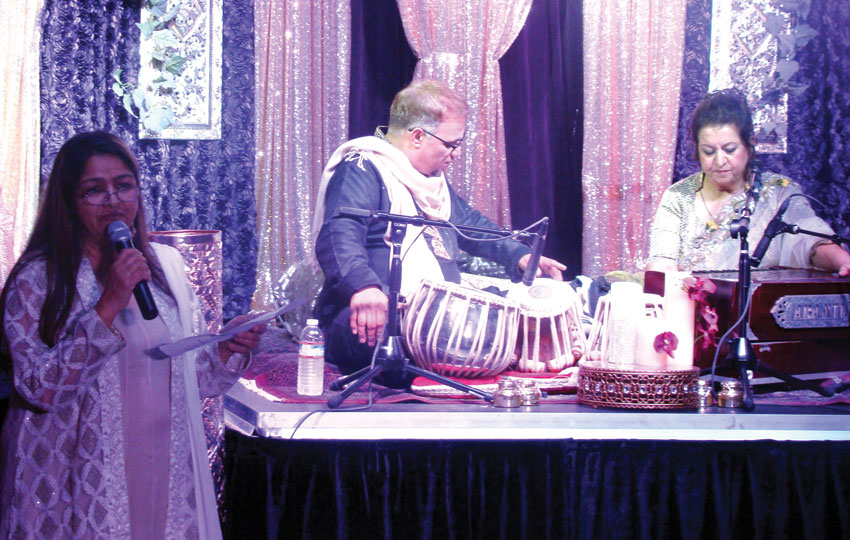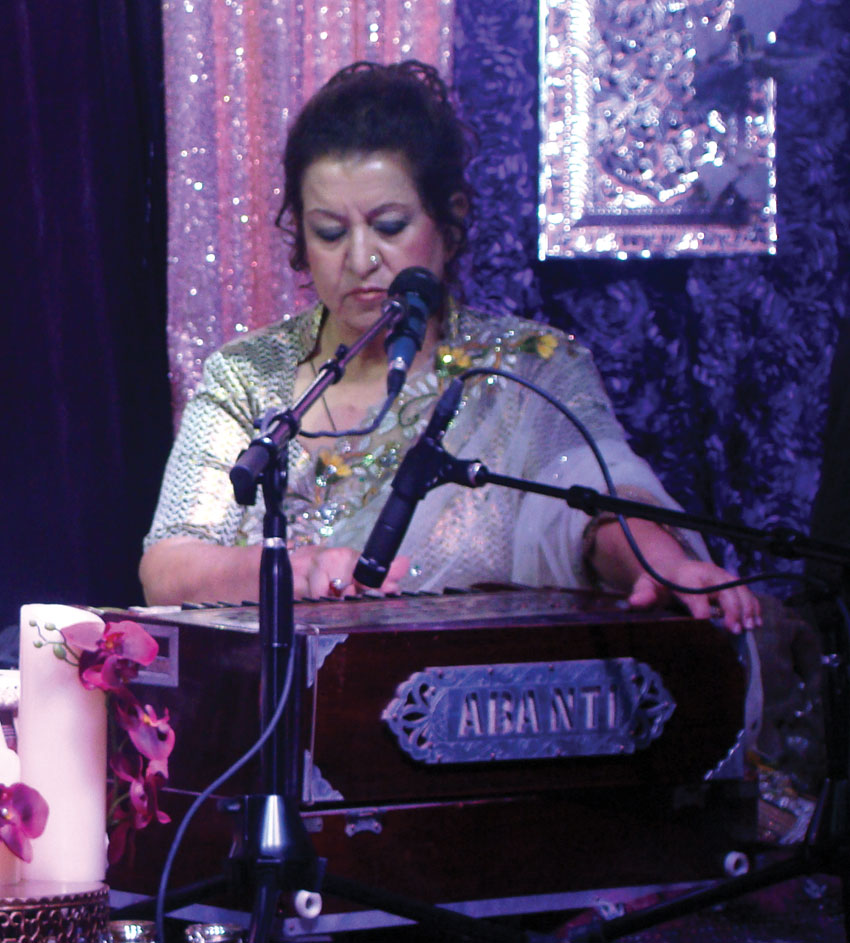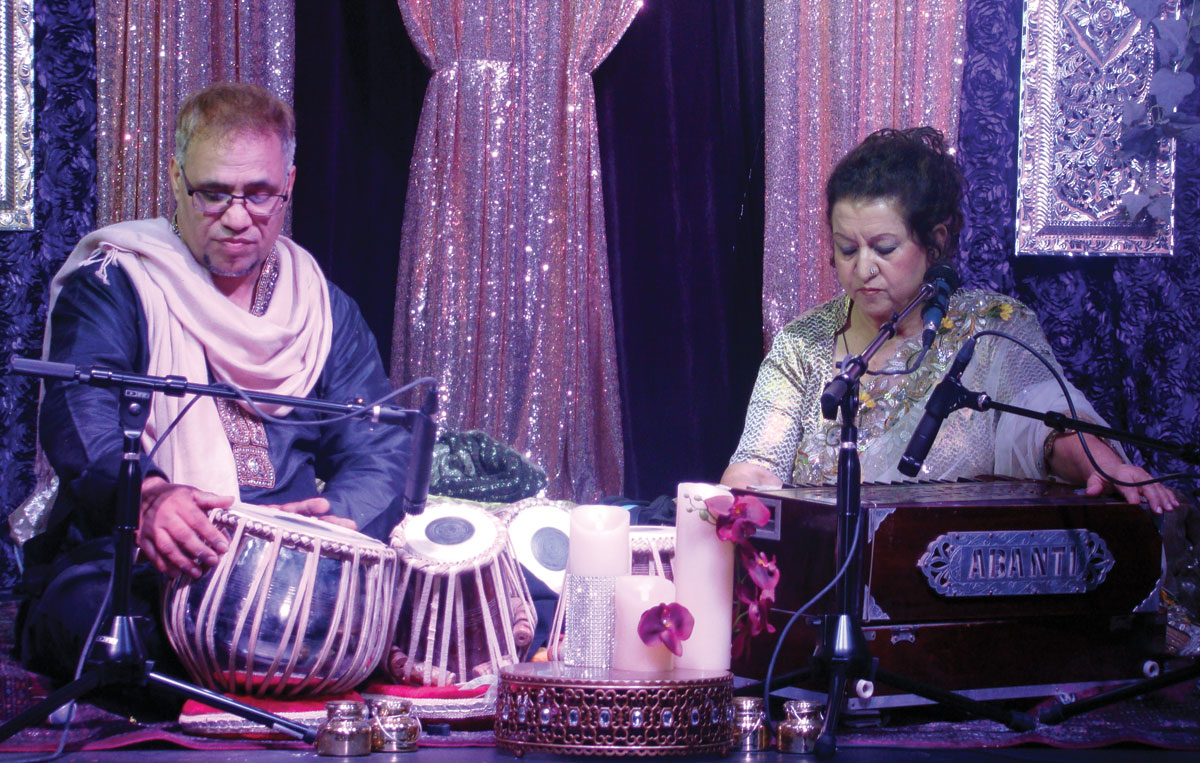GHAZAL QUEEN MUNNI BEGUM IN SACRAMENTO
Malkiat Singh on Tabla (l) and Munni Begum at a “Shaam-e-Ghazal” evening in Sacramento, Calif., Nov. 5. (All photos: Ras H. Siddiqui)
Her name has lasted much longer than its meaning. “Munni” (Little One) is usually a nickname given to a girl child in our culture, one which she is supposed to outgrow with age. But here we have Munni Begum (real name Nadira) who has made a significant place for herself in the world of Ghazal singing since the 1970’s and over 40 years later her command of her craft has not diminished one bit. She is still known as Munni Begum. And her recent return visit to the Sacramento area was welcomed by close to 300 people here with a great deal of enthusiasm, writes Ras H. Siddiqui. – @siliconeer #siliconeer #Music #Ghazal #MunniBegum #Sacramento
Held at the beautifully decorated Eden Gardens Event Center in the Sacramento county suburb of Elk Grove, the Nov. 5 event billed as a “Shaam-e-Ghazal” was organized by area cultural luminary Malkiat Singh and Eden Gardens Entertainment. The event was supported by many from the South Asian community including Dr. Jhanak Mehtani, Raj Sharma and emceed by Dr. Firdos Sheikh. It turned out to be a wonderful event for all to enjoy.

The evening started off with local talent Karan Sandhu and Jagjit along with Malkiat Singh opening and later joining Munni Begum throughout her performance. And Munni Begum herself took over commandingly proving without a doubt why she is a force in the world of Urdu Ghazal singing. After warming up on a lighter note her “Tumhare Shehr Ka Mausam” hit our senses. The tempo increased next with “Teri Soorat” which grabbed the attention of anyone distracted. And that was just to set the audience up for her very popular and slower “Ek Baar Muskura Do” (possibly her most well received song here) and then “Mareez-e-Mohabbat.” And Begum Sahiba was just getting started!
“Ae Mere Humnashin Chal” was melancholic, “Haath Diya Us Ne Mere Haath Mein” was romantic and “Awaargi Mein Had Se Guzar Jaana Chahiye” was naughty. She did take the time to honor her fellow Ghazal singer, the late Asif Ali with “Deewaron Se Batein Karna” and one of this writer’s favorites “Ishq Mein Hum Tumhe Kya Bataayein” which she sang to almost perfection. And one can add that no Munni Begum show is complete without some mention of intoxication, and she did not disappoint by including “Jhoom Barabar Jhoom Sharabi.”

The Ghazal Queen’s planned finale “Mast Qalandar” came much too early for the audience as they had her perform at least 3 encore songs including a repeat of “Ek Baar Muskura Do” and a fine “Aaj Jaane Ki Zid Na Karo.” With this performance it appears that Sacramento, Calif., has broken the Ghazal barrier because this is generally known as a Bhangra town. This event also is proof that after many years of hard work Malkiat Singh has finally succeeded in bringing the Ghazal genre to California’s Capital region. His two decades of effort is finally bearing fruit. And in this particular case it would not have been possible without the support of the Manzar family and the Eden Gardens Event Center facility.
To conclude, Munni Begum is a reflection of many in our Diaspora with multiple geographical beginnings. She belongs to a family originating in Murshidabad, West Bengal in India which settled in Dhaka and then later Karachi, and she is now rumored to have settled in Chicago. If that rumor is correct we hope to see a great deal more of her performances in California.


